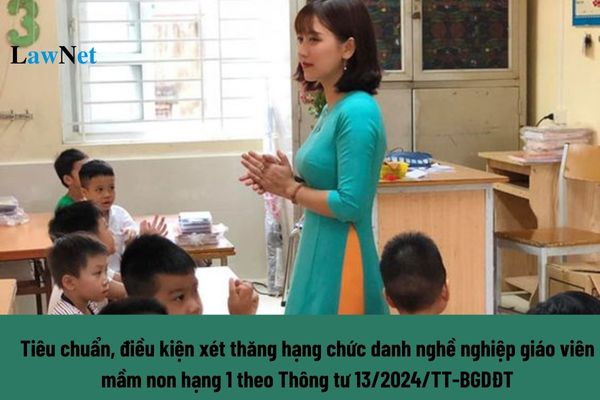Vietnam: According to Circular 13/2024/TT-BGDDT, what are the standards and conditions for consideration for promotion to the professional title of Grade I preschool teacher?
According to Circular 13/2024/TT-BGDDT, what are the standards and conditions for consideration for promotion to the professional title of Grade I preschool teacher in Vietnam?
According to Article 4 of Circular 13/2024/TT-BGDDT, the standards and conditions for consideration for promotion to the professional title of Grade I preschool teacher in Vietnam are as follows:
Preschool teachers may register for consideration for promotion to the professional title of Grade I preschool teacher (code V.07.02.24) when meeting the following standards and conditions:
- Have been appointed to the professional title of Grade II preschool teacher (code V.07.02.25).
- During the time holding the professional title of Grade II preschool teacher and equivalent, have been graded at quality as the good compilation of tasks well or higher for 5 consecutive years preceding the year of consideration for promotion to the higher professional title, including at least 2 years graded at quality as the excellent compilation of tasks; have good political, moral professional qualities; not under disciplinary action; not in the period of implementing disciplinary provisions according to the regulations of the Communist Party of Vietnam and the law.
- Meet the standards of qualifications for the professional title of Grade I preschool teacher as prescribed at point a, clause 3, Article 5 of Circular 01/2021/TT-BGDDT and clause 2, Article 1 of Circular 08/2023/TT-BGDDT.
- Adhere to the standards of professional competence for the professional title of Grade I preschool teacher as stipulated at point a, point b, point c, clause 4, Article 5 of Circular 01/2021/TT-BGDDT and clause 4, clause 7, Article 1 of Circular 08/2023/TT-BGDDT; have been awarded the emulation titles and forms of commendation according to clause 7, Article 1 of Circular 08/2023/TT-BGDDT during the period of holding the professional title of Grade II preschool teacher and equivalent.
- Comply with the requirements for the duration of holding the professional title of Grade II preschool teacher (including equivalent grade) as defined in clause 8, Article 1 of Circular 08/2023/TT-BGDDT.

According to Circular 13/2024/TT-BGDDT, what are the standards and conditions for consideration for promotion to the professional title of Grade I preschool teacher in Vietnam? (Image from the Internet)
What are the requirements regrading preschool education content and methods in Vietnam?
According to Article 4 of Circular 13/2024/TT-BGDDT, the requirements regrading preschool education content and methods in Vietnam are stipulated as follows:
- Preschool education content must be appropriate for the psychological development of children; balance protection, care, and nurturing with education; promote overall physical, emotional, social skills, intelligence, and aesthetic development; respect differences; suitable for various age groups and consistent with primary education.
- Preschool education methods are prescribed as follows:
+ Nursery education must create favorable conditions for children to actively engage in activities, play, create bonds between adults and children; stimulate the development of senses, emotions, and psychological functions;
+ Kindergarten education should enable children to play, experiment, explore the surrounding environment through various forms, meeting the children’s needs and interests.
What are the regulations on the tuition and expenses of educational and training services in Vietnam?
According to Article 99 of Education Law 2019, specific regulations on the tuition and expenses of educational and training services in Vietnam are as follows:
- Tuition is a contribution made by learners to partially or fully cover expenses of educational and training services. Tuition rate is determined based on road maps for assurance of expenses for educational and training services prescribed by the Government. For institutions of vocational education and higher education, this rate is calculated based on the Vocational Education Law 2014 and Higher Education Law 2012.
- Expenses of educational and training services include the total amount of salary, direct costs, management costs and depreciation of fixed assets in direct or indirect service of educational operation in accordance with educational programmes.
Admission fees contributed by candidates when submitting an application or taking an entrance examination shall be determined based on road maps of accuracy and adequacy.
- Students at primary education level in public educational institutions are not required to pay tuition; in areas lacking public schools, primary school students in private educational institutions shall receive subsidies on tuition from the State, with the support rate specified by provincial People’s Councils.
- Pre-school children at 05 years of age in villages and communes with exceptional difficulties, ethnic minority areas, remote and isolated areas, coastal areas and islands shall be exempted from tuition.
- Pre-school children at 05 years of age beside those regulated in clause 4 of this Article and students at lower secondary education level shall be exempted from tuition based on road maps specified by the Government.
- Mechanisms for collecting and managing tuition and service fees of educational operation are prescribed as follows:
+ The Government shall set tuition collecting and managing mechanisms for public institutions of preschool education, general education, vocational education and higher education;
+ Provincial People's Councils shall set the tuition framework and detailed tuition rate and fees of services and assistance for educational operation in public educational institutions as authorised and at the proposal of provincial People's Committees;
+ Provincial People's Committees shall set collecting and using mechanisms for admission fees of each educational level under provincial management after receiving the approval from provincial People's Councils;
+ People-founded and private educational institutions are entitled to set the rate of their tuition and other service fees, ensuring expense recoupment and reasonable accumulation. Publicly announce expenses of educational and training services and fee rate as guaranteed in school’s establishment proposal; and on the basis of each educational course/level/year as prescribed by law.

